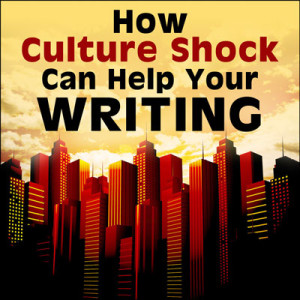How Culture Shock Can Help Your Writing
 by Jake Buller, Guest Contributor
by Jake Buller, Guest Contributor
The very first time I set foot on African soil, I went straight to a village of mud-brick houses and took selfies with Liberian kids. Then, after nine months of helping people better themselves, I returned to the USA and slipped right back into my old life.
Just kidding. That’s not actually how it went.
Yet in some novels, it seems like that’s exactly how it happens. When a character encounters a “New World,” he experiences momentary and superficial emotions, with momentary and superficial reactions. Maybe it’s awe, maybe it’s a sense of contrast, but it soon dissolves in the face of the plot. And when the character returns home, he may be changed by the events of the story, but the change the New World has wrought on him gets a passing mention, if it is mentioned at all.
This lack of change is in the same vein as my tall tale; it is not the way culture shock actually works. Yet writers who grasp the importance of culture in a story are few and far between. Most just take it for granted, like a grassland sporting grass or a mountainous area featuring, well, mountains. (It’s described in about that much detail, too.)
Culture is important, however, because it is directly tied to the most critical component of your story: your main character. And if portrayed correctly, culture can affect your character immensely, and pave the way for new conflicts and themes to fuel your story.
There are a lot of ways culture can influence a story—the list would be nearly as long as culture is complex. But here are a few concrete methods you can use to establish a vibrant and effective New World.
1. Find deeper character reactions.
This is hard, because it requires going deep into your character’s head. But it’s hugely rewarding, because once you can feel the lifeblood of a character’s emotions, your readers can too.
The physical realm is important, but when working on character reactions, don’t neglect the emotional aspect. My first experience in Africa was a whirlwind of sights and sounds—dust, humidity, stale sweat, bright colors, faded paint, and loud nightclub music. The internal details are harder to grasp, but far more important: my initial wariness in interacting with Liberians, the unexpected tendency to barricade myself in my room, and an incredible wave of poem production that I have yet to match.
Practical knowledge of how this works can be found in your own life, or in studying the lives of others.
2. Don’t neglect the details.
“Precise, unexpected details” is the old refrain, but there are few places where it is more important. Culture is easy to boil down into stereotypes. My opening paragraph contains quite a few—mud bricks, selfies, and white guys doing community service in Africa. It takes hard work to come up with details to counteract those stereotypes.
For instance, I once met a town chief who greeted us with a stocking cap perched on his grizzled head like a fez. Did I expect to see something like than in an African village? Uh, no. Details like that are crucial, because they are fresh and unexpected.
Sensory details are important too. I’ll never forget the first time I stepped out of an airplane and into the Liberian air—it was a wall of humidity, the kind that got up into your nose and cleared it out, and hung on your shirt till you started sweating. Later, after I had been living there for a while, I was able to detect which way the rain was coming from by how it smelled. (Rain off the ocean smelled clean and filtered, and rain from the interior smelled earthy and rich.)
3. Work hard to establish otherworldliness.
Contrast is important. Show the reader where your character is coming from, and the New World will seem that much newer. Liberia was otherworldly to me because it was so different—because motorbikes were so prevalent, and the dirt was so red, and the people just scraped along, living in tin shacks and cramming so many people in one house. That was only important because motorbikes were scarce in Kansas, the dirt was brown, and the people so much richer.
4. Delve into the darker side.
Living in a New World can be tough. Really tough.
For nearly a year, I experienced the effects of culture shock without knowing it. It could be analogous to someone training for a sport; it’s a lot of work to get to the point where you’re adept enough to actually have fun. Until then, it’s rough. It took me at least nine months to get to the point where I was comfortable enough in the Liberian culture to fully enjoy it. It took surviving without running water, learning the dialect, getting malaria (and intestinal worms, but those aren’t so bad), and coping with the reality of death. It’s anything but easy, and some parts of it never go away.
My point here is that to accurately portray a New World, you have to get down to some of the nitty-gritty and uncomfortable aspects of it. Your character shouldn’t just be in awe of a culture; he or she should be more than a little apprehensive that they’re expected to navigate this tangled mess. It’s hard. It forces you to grapple with your own culture, to figure out how to see without the glasses your culture lends you.
Sometimes this has to be experienced to be fully known. But even if you can only try, it’s important. It gives your character a conflict; navigating culture, even if it’s just a gap between the upper strata and the lower strata of the same society, provides you with a rich arsenal of material you can use to craft a story that resonates.
…
If you have encountered a “New World,” how did the experience enrich your storytelling?
…
J. Tobias Buller—“Jake”—is a missionary kid, a writer, and a strongly loyal Kansan. He has written eight speculative fiction novels and one historical fiction novella, two of which were written via The One Year Adventure Novel. His other work includes a long-winded blog, snarky essays, and a memoir he wrote about his experiences during Liberia’s Ebola outbreak.
He moved to Liberia in November 2011—the beginning of three and a half years of adventure. He currently resides in Liberia, but he plans to be eaten alive by American collegiate education in the fall of 2015.




The closet I’ve come to experiencing “The New World,” was when I moved from suburban Missouri to the swampy deep south. The poverty level here is nothing like Liberia, but it shocked me. I can barely remember the first week, although it was only two months ago. I recall it as a blur between sob sessions. That whole week, it seemed like my heart was always beating twice as fast, in preparation to flee to who know’s where.
Good article, Jake. It provoked me to think about culture shock in my own life, much like Michaella mentions. It comes in unexpected places at times. And I think, since it does come in unexpected places, that it should encourage writers to be observant of the variety of places people experience it and build upon that to show conflict in their stories–not just stories of “overseas,” which I think you were saying. Personally, it was culture shock for me to go to graduate student parties with Mark. Yikes!
I tried to say something smart here, but I think a more accurate response would be: hmmm.
Good stuff to think about.
Really good write up! It helped me to think more about my one week experience at a small town in Colombia Amazones. Until now(even though it’s been two years), I never really had the chance to think about and process my experience as I wished. My sister went back this last year, and lived there for 6 months. I do know that when we came back there was this sort of feeling of loneliness. We didn’t know anyone who could identify with our experience. Felt like we didn’t really belong any where. We got a small taste of “But the son of man has where to lay his head.” The feeling didn’t last as long with me as it did my sister(she still has a lot of “moments”) since I was only there for a week and she much longer. But a week was long enough to at least allow me to imagine what’s it’s like for her and lots of other missionaries… And my novel charries.